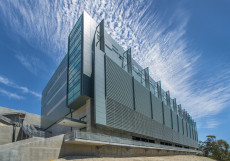Shyh Wang Hall Achieves LEED Gold Certification
March 29, 2017
Berkeley Lab’s Shyh Wang Hall (Bldg. 59)—home to the Computing Sciences organization—is being commended for its environmental and energy-efficient design after earning a Gold LEED (Leadership in Energy and Environmental Design) certification from the U.S. Green Building Council (USBGC).
LEED is a prominent green building certification that rates a building’s sustainability aspects. It was implemented as a way to evaluate the environmental performance of a building and to encourage market transformation toward sustainable design. Points are awarded across a variety of categories, including use of renewable energy, water efficiency, innovation in design and more.
Beyond the basic LEED certification (40-49 points) are the Silver (50-59 points), Gold (60-79) and Platinum (80 points and above) levels. Wang Hall achieved a total of 69 points, scoring particularly well in Sustainable Sites, Water Efficiency, Indoor Environmental Quality and Innovation in Design.
“With this certification, the USGBC has recognized the unique and sustainable features of this beautiful, high performance computing facility,” said Berkeley Lab's Sheree Swanson, the Shyh Wang Hall project director. “Energy efficiency and innovation in design were top priorities throughout the design and construction.” Examples of features that contributed to the Gold certification include innovative cooling that eliminated the need for conventional chillers and maximized the use of outside air, large hydro-modification tanks underneath the facility that mitigate storm water runoff impact and a low-emissivity roof to reduce radiant thermal energy, she noted.
Wang Hall, which was officially unveiled in November 2015, is Berkeley Lab’s sixth building to earn LEED certification, including one LEED Platinum and four other LEED Gold certifications.
About Computing Sciences at Berkeley Lab
High performance computing plays a critical role in scientific discovery. Researchers increasingly rely on advances in computer science, mathematics, computational science, data science, and large-scale computing and networking to increase our understanding of ourselves, our planet, and our universe. Berkeley Lab’s Computing Sciences Area researches, develops, and deploys new foundations, tools, and technologies to meet these needs and to advance research across a broad range of scientific disciplines.







 Instagram
Instagram YouTube
YouTube